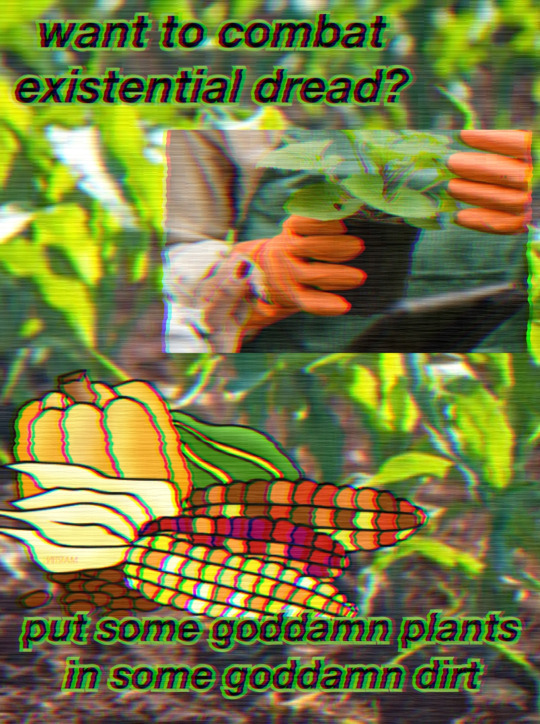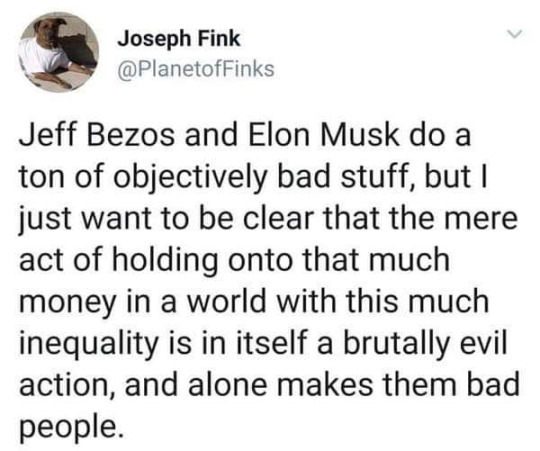Text
One of permaculture's earliest missteps was its belief that we should all become small-time capitalists in the service of the movement. This has led to a proliferation of permaculture-related small businesses—YouTube channels, personal brands, conferences, etc. I have no objection to this as a matter of survival; everyone has to make money somehow under the relentless demands of capitalism. But relying on businesses to do the work of evangelizing has essentially turned permaculture into a consumer trend, rather than a movement. A movement is not a stack of books, an endless series of Kickstarters, and a bunch of social media stars. A movement is a collective attempt to change society. Operating as businesses and personal brands makes the "collective" part impossible since those are necessarily individualistic ventures, and it also greatly limits what kinds of change can be made. We cannot move beyond capitalism—which is greatly accelerating the destruction of life on Earth—by being capitalists. We cannot spread permaculture by undermining the condition for our own survival. If permaculture is to become a movement rather than a consumer tchotchke, it will need to stop functioning as a constellation of small businesses and start building collective power on the basis of solidarity. This is called organizing, and it means working together to fight for our shared interests, as permaculturists and as humans living on an imperiled planet.
252 notes
·
View notes
Text
I broke my never explain yourself on the internet rule for sweet fuck all. The mild amusement from accidentally trolling wasn’t even worth it.
Neurotypicals calling me passive aggressive for saying exactly what I mean with zero subtext never fails to make my ass itch. It would be hilarious if it wasn’t so damn irritating.
Anyway. I left the forum and the usual suspects were blocked. I learned my lesson
at least until next time.
2 notes
·
View notes
Text
Bro, you ok? Bro, humans aren’t separate from the ecosystems around us. We’re a part of them, bro. Bro, we’re never going to have absolutely zero effect on ecosystems, because we live here, bro. Bro, I never said it had to be a bad effect. We don’t have to immediately be perfect either, bro, sometimes doing what you can is what you can, and its way better than nothing. Bro what do you mean humans are a plague. You’re starting to sound a bit like an ecofascist, bro… Bro?
68K notes
·
View notes
Text
Legit though, we should start turning ecosystem restoration and work to make our world more tolerant to the effects of climate change into annual holidays and festivals
Like how just about every culture used to have festivals to celebrate the beginning of the harvest or its end, or the beginning of planting, or how whole communities used to host barn raisings and quilting bees - everyone coming together at once to turn the work of months or years into the work of a few days
Humble suggestions for festival types:
Goat festival
Besides controlled burns (which you can't do if there's too much dead brush), the fastest, most effective, and most cost-efficient way to clear brush before fire season - esp really heavy dead brush - is to just. Put a bunch of goats on your land for a few days!
Remember that Shark Tank competitor who wanted to start a goat rental company, and everyone was like wtf? There was even a whole John Oliver bit making fun of the idea? Well THAT JUST PROVES THEY'RE FROM NICE WET PLACES, because goat rental companies are totally a thing, and they're great.
So like. Why don't we have a weekend where everyone with goats just takes those goats to the nearest land that needs a ton of clearing? Public officials could put up maps of where on public lands grazing is needed, and where it definitely shouldn't happen. Farmers and people/groups with a lot of acres that need clearing can post Goat Requests.
Little kids can make goat-themed crafts and give the goats lots of pets or treats at the end of the day for doing such a good job. Volunteers can help wrangle things so goats don't get where they're not supposed to (and everyone fences off land nowadays anyway, mostly). And the goats, of course, would be in fucking banquet paradise.
Planting Festival and Harvest Festival
Why mess with success??? Bring these back where they've disappeared!!! Time to swarm the community gardens and help everyone near you with a farm make sure that all of their seeds are sown and none of the food goes to waste in the fields, decaying and unpicked.
And then set up distribution parts of the festival so all the extra food gets where it needs to be! Boxes of free lemons in front of your house because you have 80 goddamned lemons are great, but you know what else would be great? An organized effort to take that shit to food pantries (which SUPER rarely get fresh produce, because they can't hold anything perishable for long at all) and community/farmer's markets
Rain Capture Festival
The "water year" - how we track annual rainfall and precipitation - is offset from the regular calendar year because, like, that's just when water cycles through the ecosystems (e.g. meltwater). At least in the US, the water year is October 1st through September 30th of the next year, because October 1st is around when all the snowmelt from last year is gone, and a new cycle is starting as rain begins to fall again in earnest.
So why don't we all have a big barn raising equivalent every September to build rain capture infrastructure?
Team up with some neighbors to turn one of those little grass strips on the sidewalk into a rain-garden with fall-planting plants. Go down to your local church and help them install some gutters and rain barrels. Help deculvert rivers so they run through the dirt again, and make sure all the storm drains in your neighborhood are nice and clear.
Even better, all of this - ESPECIALLY the rain gardens - will also help a ton with flood control!
I'm so serious about how cool this could be, yall.
And people who can't or don't want to do physical stuff for any of these festivals could volunteer to watch children or cook food for the festival or whatever else might need to be done!
Parties afterward to celebrate all the good work done! Community building and direct local improvements to help protect ourselves from climate change!
The possibilities are literally endless, so not to sound like an influencer or some shit, but please DO comment or reply or put it in the notes if you have thoughts, esp on other things we could hold festivals like this for.
Canning festivals. "Dig your elderly neighbors out of the snow" festivals. Endangered species nesting count festival. Plant fruit trees on public land and parks festival. All of the things that I don't know anywhere near enough to think of. Especially in more niche or extreme ecosystems, there are so many possibilities that could do a lot of good
3K notes
·
View notes
Note
Autumn and winter is a RUBBISH time for my love of solarpunk to be rekindled, because so much of what I can act on is guerrilla gardening. Alas, here I am, getting back to my solarpunk roots.
Do you have any suggestions for solarpunk activities we can work on in the cold months?
God I feel for this!!! Winter always feels like such a festering time to be in love with solarpunk. Not to mention how starved we are for winter content for solarpunk and lunarpunk in general. But yeah!! Here's some ideas to do in winter!!!
Out and about:
There are a lot more social clubs in your city then you'd expect! I know 2 different community associations in my city that have social clubs that go in adult field trips (like to farms and cafes ans boardgame places!!)! And have crafting clubs! And the best part is if their in your community, it's within a decent walk of you but it's almost always walkable!
Using a library!! For anything! Everything! In my provenance we got a saying "Use it or they
Graffiti- leaving kind messages or fun stickers all over the place isn't really a weather restricted activity for the most part. I know someone who made a Playlist filled with union songs and rebellion songs and put a code for it and links to how to unionize on stickers and did that.
Adopt a stop- more cities have these then you might think! But adopt a stop programs basically let you take care of a certain bus stop and this lets you add things (like good benches, shoveling and removing ice, asking the city to add heaters, etc..) you become the advocate for that bus stop. If your city doesn't have a program like it yet you can ask your city or community to start one since it saves a bunch of money on maitance costs!
At home:
Archiving and pirating - highly recommend doing it in a physical sense if you can afford it. Bc then you can give them out as gifts!
Create!! - Sewing, sewing for friends, knitting gloves/scarfs for ppl who might need it, make art to inspire others via writing or drawing or other mediums! Gift economies require gifts after all so make some!
Learn! - learning a new skill, like canning or how to install solarpanels. Researching in general, but also keeping up to date with local politics and what you can do on the ground there. Building up knowledge is such as useful even if it doesn't feel like your doing anything.
Connect! - Shoveling neighbors walkways, or in general connecting with the ppl in your immediate surroundings! They can help you out in ways you couldn't imagine, someone didn't bake often so they gave me 15lbs of flour!! And their extra pair of snow boots, I hadn't had snow boots since I was 12 years old and it meant the world to me. The pizza I taught her daughter to make and a cheap meal for them meant the world for them. These small acts really are what tie each other together.
Plan! - plan for next year, what kind of equipment can you gather? What do you wanna accomplish next growing season? Seed swaps are also a fun thing I know ppl will do in winter as they start preserving food!
410 notes
·
View notes
Text
“There will be a lot of people out there who are not going to like this,” says Gow. “They like to do things very slowly and consider every option, have another cup of tea, have another Kipling cake, have another wee chat in four months’ time. If we keep on course with this we’ll be left living on a planet full of pigeons and dogs on the beaten-down crust of our own excrement.”

Advocates of rewilding agree that we need to be bolder when it comes to species reintroductions. Dr Christopher Sandom, a senior lecturer in biology at the University of Sussex, says the assumption should be that we will reintroduce lost native species unless there is a good reason not to. “I think the burden of responsibility is wrong,” he says. “The starting point should be we expect these species to come back. If someone has a really, really good reason why that’s going to be a massive problem for a particular area, they should be making the case to say why it shouldn’t be happening.”

American farmer and poet Wendell Berry has described farming as a conversation with nature, but the modern farming system is broken. Many farmers are victims of a system that has become a race to the bottom in which the environment, livestock and people pay a heavy price for the consumer’s cheap food. Gow believes farmers should farm in a way that respects nature. In some areas this will be growing cereals or grazing traditional livestock, and in other parts – less suited to agriculture – there should be beavers, wildcats and storks.
To many, rewilding may seem like a pipe dream, but Gow proves this type of fanciful thinking can become a reality.
111 notes
·
View notes
Text
Reblog if you think public libraries are important and should be maintained.
237K notes
·
View notes
Text

"You don't hate Mondays, you hate capitalism"
Sticker spotted in Frankenthal, Germany
3K notes
·
View notes
Text
what could it beee???????
#dimension 20#d20#burrow's end#place your bets#I'm going with a battlemap filled with severlys mutated woodland critters
104 notes
·
View notes
Text
The unknowable being in a creaky suit that looked back at Thorn

my other absolute bullshit is in no way correct theory about burrows end is that all the powder is from a gender reveal gone wrong and that the blue is from like blue smoke from a stupid fucking gender reveal. i don’t think it’s right at all. it was just a dumb thought and i need to share it with you all.
2K notes
·
View notes
Text
USA Native Plant Resource Masterlist
Because Google is totally useless and won't help you with ANYTHING
iNaturalist: Take photos of living things you see, post them, and the community will identify them for you. Data from iNaturalist is used in scientific research.
Wildflower.org Plant Database: Enter search criteria and find some plants. Very useful if you're looking for plants with specific qualities or know what you have in mind.
Native Plant Finder: This website is still in beta and is a work in progress, but it will show you plants for your area ranked by the number of butterflies that use them for their caterpillars.
WildflowerSearch: AMAZING resource for identification and for learning about new plants. Shows you where plants are native/not native, TONS of search filters.
Native Plant Trust: A New England organization, but probably useful to anyone.
Northern Forest Atlas: Great images and identification resources for trees; has good pictures of bark, seeds, buds, leaves.
FloraFinder: Another plant database site that's being slowly built up by a passionate nerd.
MonarchWatch milkweed by USA ecoregion: Tells you what milkweed species you should plant for monarch butterflies.
Native Beeology: Not plants, but a closely related subject.
I will add more and post an updated list as I find more.
7K notes
·
View notes
Text
Punk Gardening!
It’s that time of year again where you are all out there planting gardens and being anxious about how none of your seeds have come up, or they’re “leggy” or there’s too many weeds or you didn’t water them enough.
And I’m here to say screw all that. You’ve been sold what a “garden should look like” by pesticide and herbicide companies. To be perfectly honest you’ve been sold that about your lawn too, but that’s for another post. It's time to take back gardening and grow some delicious, nutritious food!
So let’s talk about some things that can make you grow a happy, healthy, gnarly-butt garden that’s gonna grow a lot of food and take very little actual effort.
First: Weeds
There’s no such thing. Weeds are a myth. There are plants in your garden that weren’t the ones you planted? Great. Plants like to grow in your dirt. That should make you happy. It means the ones you want to grow will probably also like your dirt and want to grow their fruit/bodies there.
You’ve probably been told non-planted plants take nutrients from the plants you want there. They don’t. Seriously. For one thing, plants need different things, and clover isn’t going to want the same nutrients as your tomatoes, and it’s also probably not going to out-compete your tomatoes for sun. In fact, “weeds” also contribute good things and generally work together with your other plants.
Good plants to see growing in your garden:
Clover: A nitrogen fixer, meaning it will help your garden self-fertilize year to year. You want as much of this as possible in your lawn, too. It’s killed by a lot of major herbicides though, so to justify it’s use, you’ve probably gotten told you want a monoculture of bladelike leaves for the “perfect lawn”. A perfect lawn like that is both really hard to keep alive if not the exact correct type for your yard, and also generally needs added nitrogen fertilizer… because you removed the clover with your herbicide… sigh.
Dandelions: These are great because they have a really deep taproot that breaks up ground and brings water and nutrients to the surface for your other plants to enjoy. This means less watering, less fertilizing, and less need to till the soil before planting! Plus, young dandelion greens, while bitter, make a great topping for a salty sandwich or pasta dish. Their early-season buds can be pickled for capers, and if you’re vegan, cheap, or just want some variety, you can make dandelion “honey” by using dandelion flowers to flavor a sugar syrup.
Henbit: not going to hurt anything, gives good root mats that can help keep water in the soil around your plants, and is also edible, if bitter.
Grass: Similar to henbit, it creates a root mat that aerates soil, keeps in moisture, and prevents erosion.
Plantain: There’s not as much I can say about this one, but it’s not going to hurt anything. And you can make tea out of it if you like.
The only plants I would really take out are the spiky ones (that might make it hard for you to access your food come time for harvest, and are easier to remove when small) and really tall ones with large leaves, which genuinely may shade out smaller plants, especially at the beginning of growing season. If you have a bed near a tree that produces a lot of seedlings, you may also want to be selective about which ones you keep, if any.
Second: Choosing Seeds
You can go the cheap/free way (link), and make yourself a nice dumpster garden out of discarded food scraps. If you’re particularly daring or broke I recommend going to an actual dumpster, since a lot of the discarded produce will be overripe and most plant-able. If you’re gonna invest in seeds, though- make them ones that are native to your area. As my dad found out after several failed years of 2-fruit harvests- growing lemons in Ohio is expensive and futile. Something like sweet potatoes or squash though will be a much better use of your energy.
You can easily recoup your investment in good seeds if you get heirloom and save the seeds for next year, limiting the number of times you’ll have to buy them in a lifetime. A lot of time it’s as easy as letting a few plants/fruits “go to seed” or overripen, then remove and dry the seeds. This is especially easy for brassicas, lettuces, and greens, but can also be done for tomatoes, cucumbers, squashes, and others with a little research and strategic planting to ensure minimal inopportune cross pollination.
Third: Planting and Care of Your Plants
Historically, nature has been pretty dang successful in growing things. Even things humans have decided we like to eat. The biggest thing you can do for yourself here is think “what would nature do?”.
Nature doesn’t till. Generally you can help root veg (carrots, beets, potatoes, etc…) get a little bigger/more uniform by roughing up the soil, but you don’t have to do it for anything else. Not tilling actually helps plants grow longer and more complex root systems, which decreases the need for watering and fertilizing, and they’re more likely to survive high winds.
Nature doesn’t plant things in rows ¼ inch deep. She dumps a ton of seeds in one area, half of them get eaten by birds, the other half sprout and beat each other up trying to get sunlight. A few nice, hardy, delicious plants remain. You can take some advice from this, but also help nature in this regard. I recommend dumping a ton of seeds in a section, then scrabbling your hand through them and the dirt over the area you’d like them to grow. There. Planted. Some will grow too close to each other and may stunt each other’s growth. You can thin to an appropriate distance, and generally eat the sprouts whole in a salad. You’re just gonna have to assume that some of the seeds will be eaten by birds/squirrels and be okay with that. Seeds are cheap and a renewable resource- especially if you got them from a dumpster.
Nature doesn’t start seeds indoors. Just plant when it says on the packet outside.
Nature doesn’t water things regularly. If the soil is super dry when you plant, you may want to dampen it with some tap water. Other than that, water only when it’s been dry for a week or so, or the ground is exceptionally dry despite your clover and grass cover.
Nature doesn’t use petroleum-based fertilizers. She uses composted organic material (vegetable food scraps, yard waste if you’re on a 1-year compost cycle, plus pet waste, meat and dairy scraps if you’re on a 3-5 year cycle), and urine. Yes your urine. It’s great. High in nitrogen. Very free. Add it to your compost or use it directly by mixing it with about 3 parts water. You can either apply it in the rain or just try not to get too much of it on the leaves- pee plus sun will burn leaves.
Finally, nature doesn’t neatly harvest on a particular schedule. Leave a tomato plant out and watch a deer go to town on it. We actually had all of our tomato plants last year eaten down to nubs early in the season, and they came back and gave us one of the best harvests ever! I don’t recommend this as a strategy, per se, but if you’re picking something like greens or basil, harvest by just grabbing handfuls and ripping it off the plant. Our basil and other greens LOVE this and grow massively when we do this.
Fourth: Miscellaneous Tips
Move your plants around year to year. Crop rotation isn’t just a big farm thing. Tomatoes are going to take what they need from the soil but leave the rest and add something back with their own decomposition, which might be something your squash wants next year, etc.. You don’t have to be perfect about it, just try to put things in different places from the year before.
Speaking of which, once you’ve gotten what you can out of them, just chop the plants up and cover them with a little topsoil or mulch at the end of the season. Saves you time and returns everything you can back to the soil. You may get volunteers next season, but really the more the merrier!
Also- some plants you can eat a lot more of than others. For example, the only thing edible on a tomato plant is the tomatoes. But radishes? You can eat the root, the greens, the flowers, and the seed pods, and they are all great! Look into other things you have growing and you might end up with more food than you thought!
Your plants will look weird. That’s okay. Some of the leaves may rot or fall off. The tubers will be weird shapes because they grew next to a rock. Some of them will get eaten or break and be a little behind because they had to grow back. Your tomatoes may have a crack or two in them. Just eat those first. Produce isn’t supposed to be as perfect as it is at the store, and it’s not a problem that it loses a few leaves or is “leggy” at first or other things people worry about. Plants grow, sometimes weirdly. That’s really, genuinely, okay. It very likely won’t harm the end product at all.
2K notes
·
View notes
Text
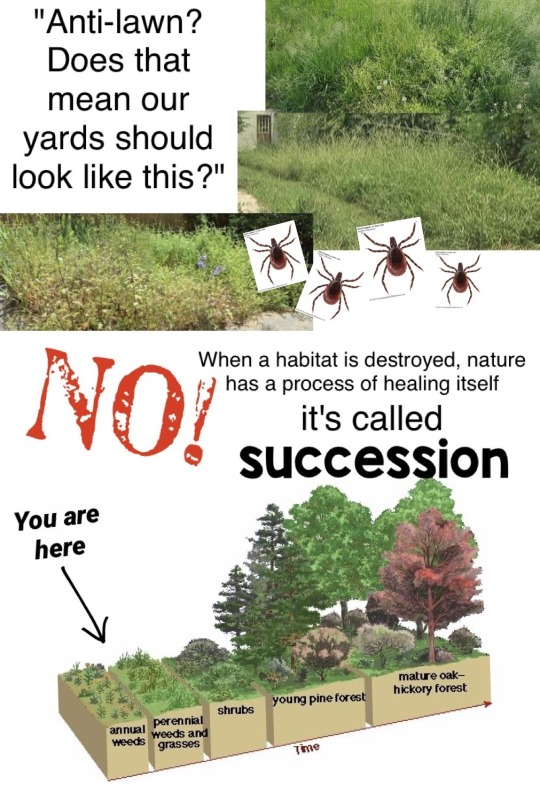
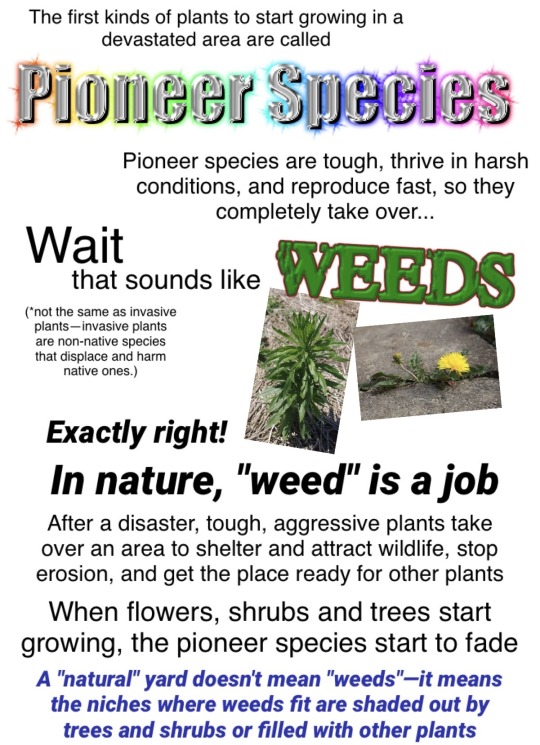
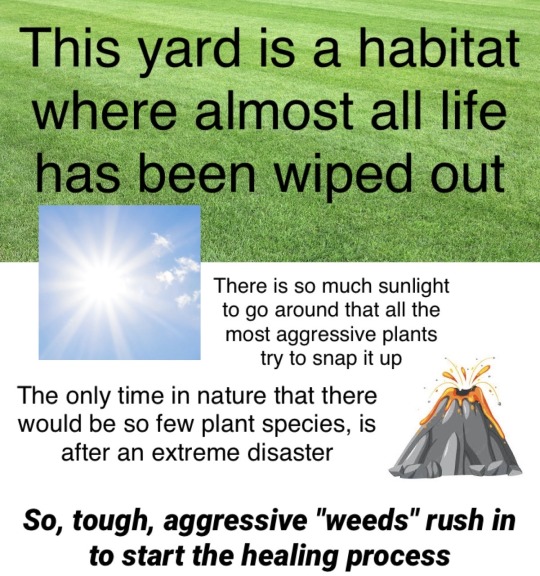
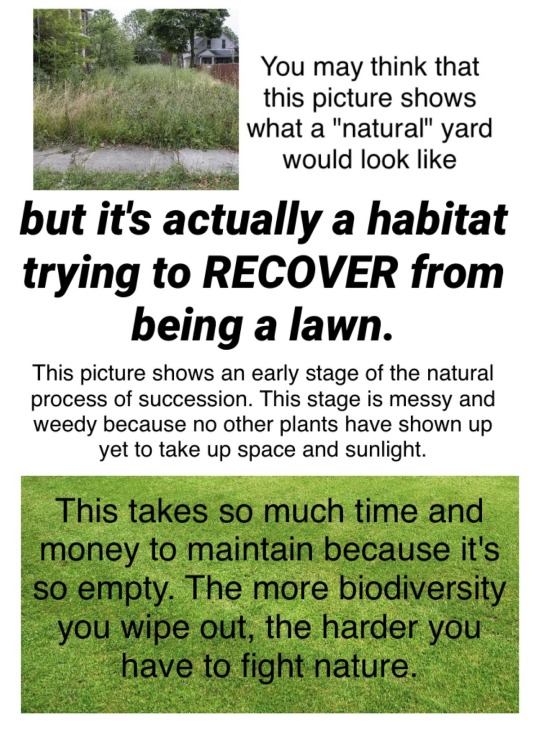
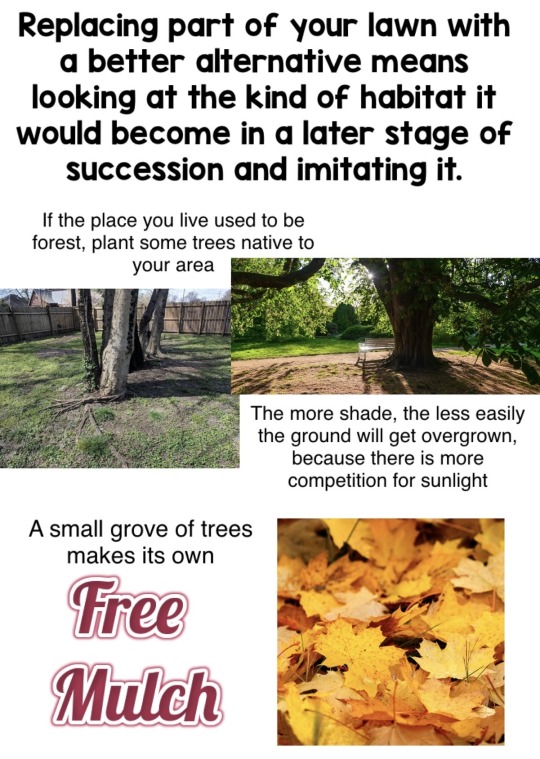
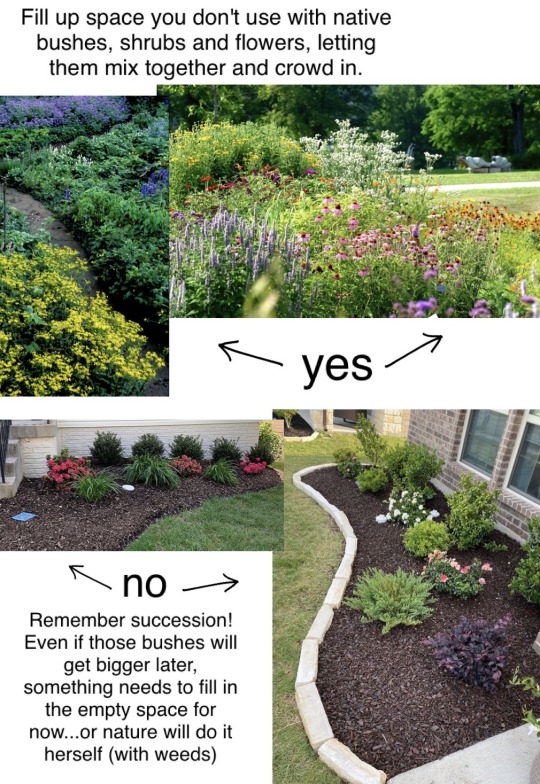
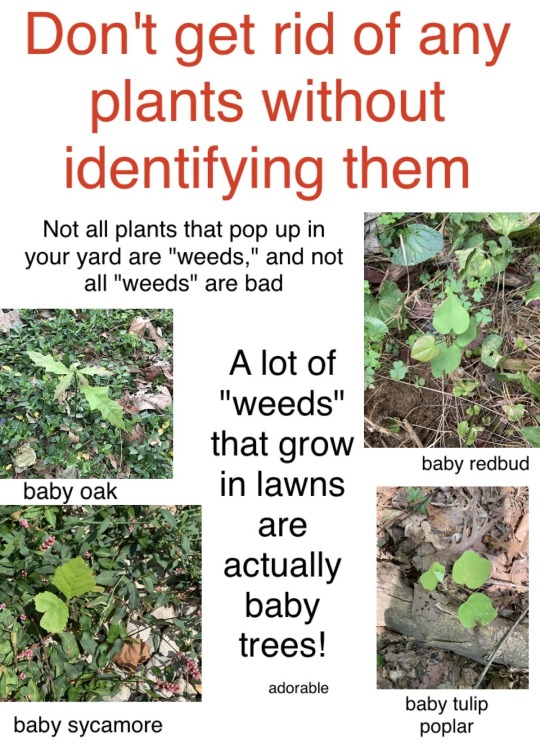
I...tried to make a meme and got carried away and made A Thing that is like partially unfinished because i spent like 3 hours on it and then got tired.
I think this is mostly scientifically accurate but truth be told, there seems to be relatively little research on succession in regards to lawns specifically (as opposed to like, pastures). I am not exaggerating how bad they are for biodiversity though—recent research has referred to them as "ecological deserts."
Feel free to repost, no need for credit
215K notes
·
View notes
